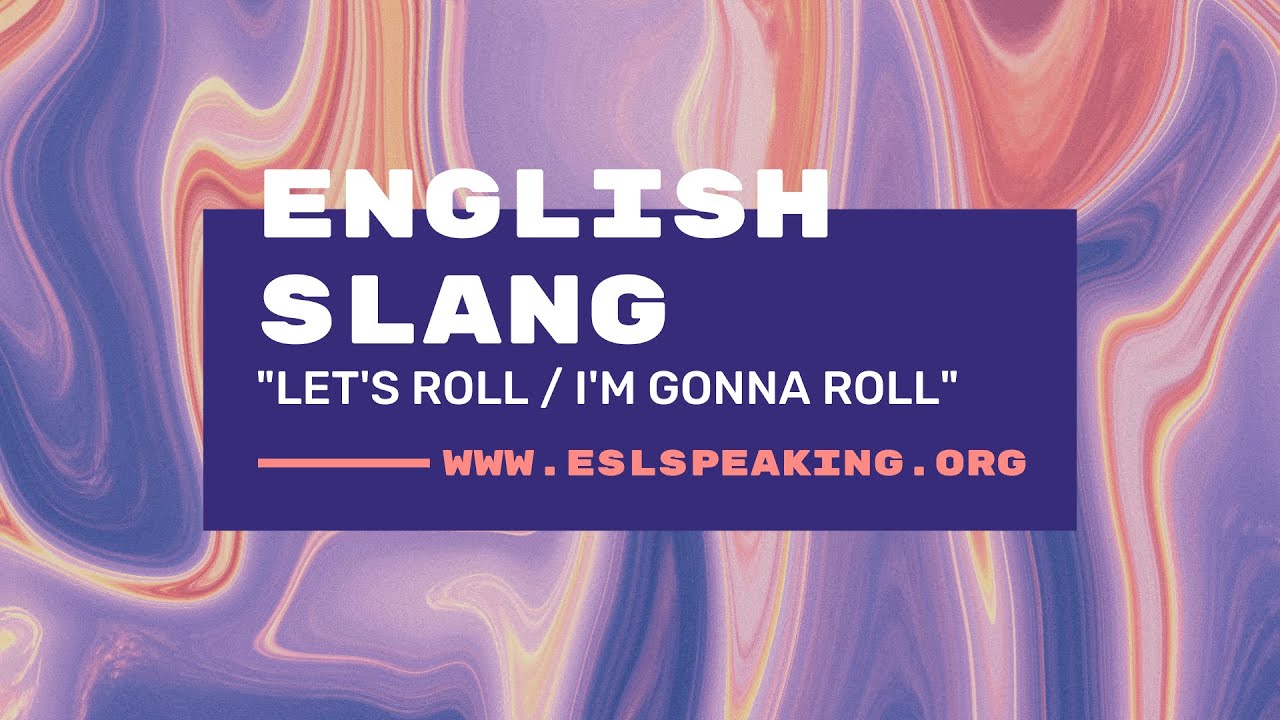
Let's Roll / I'm Gonna Roll (English slang expressio...
573 views · Nov 23, 2022 eslactivity.org
Let's roll is another way to say, let's get going. It's a common English slang term. Check out the video to find out all the details you need to know about it. Let's roll / I'm gonna roll definition = go somewhere; to start moving. Let's roll examples: "We're done shopping here. Let's roll." "I'm getting tired and I have to work tomorrow morning. I'm gonna roll." Want to find out more? Check out: https://eslspeaking.org/american-english-slang/ American English Slang: https://amzn.to/3oo2OYB Even more Ideas for the TEFL Classroom: https://eslspeaking.org/ https://www.facebook.com/eslspeaking https://www.pinterest.ca/eslspeaking/ https://www.instagram.com/jackie.bolen/ https://www.tiktok.com/@englishwithjackie #learningenglishwithjackie #teachingenglishwithjackie #slang #slangwords Tags: let's roll, let's roll meaning, meaning of let's roll, let's roll mean, what does let's roll mean, let's roll slang, slang let's roll, slangs let's roll, i'm gonna roll, i'm gonna roll meaning, meaning of I'm gonna roll, I'm going to roll, I'm going to roll meaning, meaning of I'm going to roll, get outta here Transcript: This is Jackie from eslspeaking.org. So today's slang is, let's roll. Or, I'm gonna roll. Let's roll/I'm gonna roll. You could say, "Let's roll," to your friend if you want to go, if you want to leave. Maybe you're at a party or a restaurant, or a movie theatre and you want to go home, you say, "Hey! Let's roll." Let's go home. Let's get outta here. Or, if you're at a party, or some event, or dinner and you're going home but your friend is staying, you can say, "I'm gonna roll." I'm going home but you are staying.
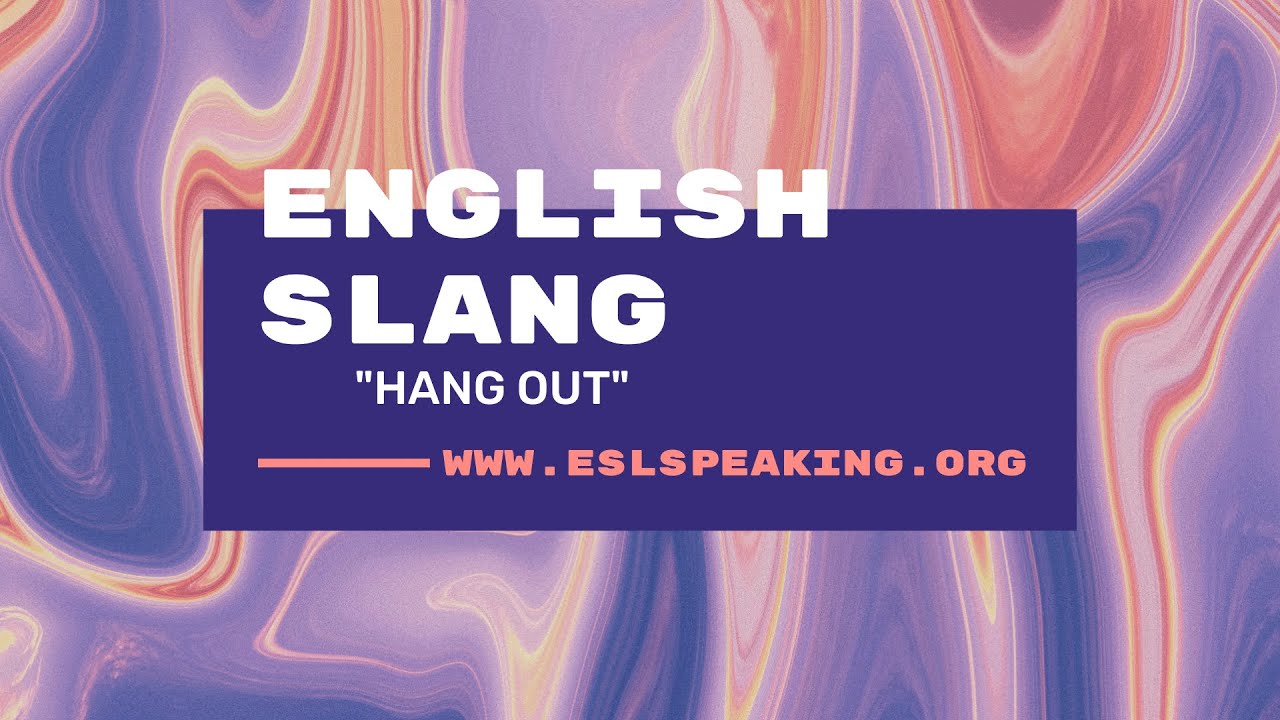
Hang Out (American English Slang) | Learn American English i...
640 views · Nov 23, 2022 eslactivity.org
Hang out is a popular English slang term that means to spend time with somebody. Check out this video for all the details you need to know, along with some helpful examples. Hang out definition = spend time with someone. Hang out examples: "Do you want to hang out tomorrow night?" "Yuri and I are hanging out later, do you want to join?" Want to find out more? Check out: https://eslspeaking.org/american-english-slang/ American English Slang: https://amzn.to/3oo2OYB Even more Ideas for the TEFL Classroom: https://eslspeaking.org/ https://www.facebook.com/eslspeaking https://www.pinterest.ca/eslspeaking/ https://www.instagram.com/jackie.bolen/ https://www.tiktok.com/@englishwithjackie #teachingenglishwithjackie #esl #learningenglishwithjackie #slangwordsdefined Transcript: It's Jackie from eslspeaking.org. Today's slang word is, hang out. Hang out. Hang out means to spend time with someone but usually, it means you have no specific plan. If you say, hey do you want to hang out? It means come over to my house or maybe we go to the park. There is no definite plan like a dinner plan or a movie plan. It just means spending time together. Here's an example sentence, "Hey, so what are you doing this weekend?" "I'm hanging out with my friend." Or, "Do you want to hang out tonight?" "Sure, that sounds great. Come over to my house." If you like this slang expression, please be sure to check out my book American English slang and don't forget to like it, leave a comment, subscribe and I'll catch you next time.
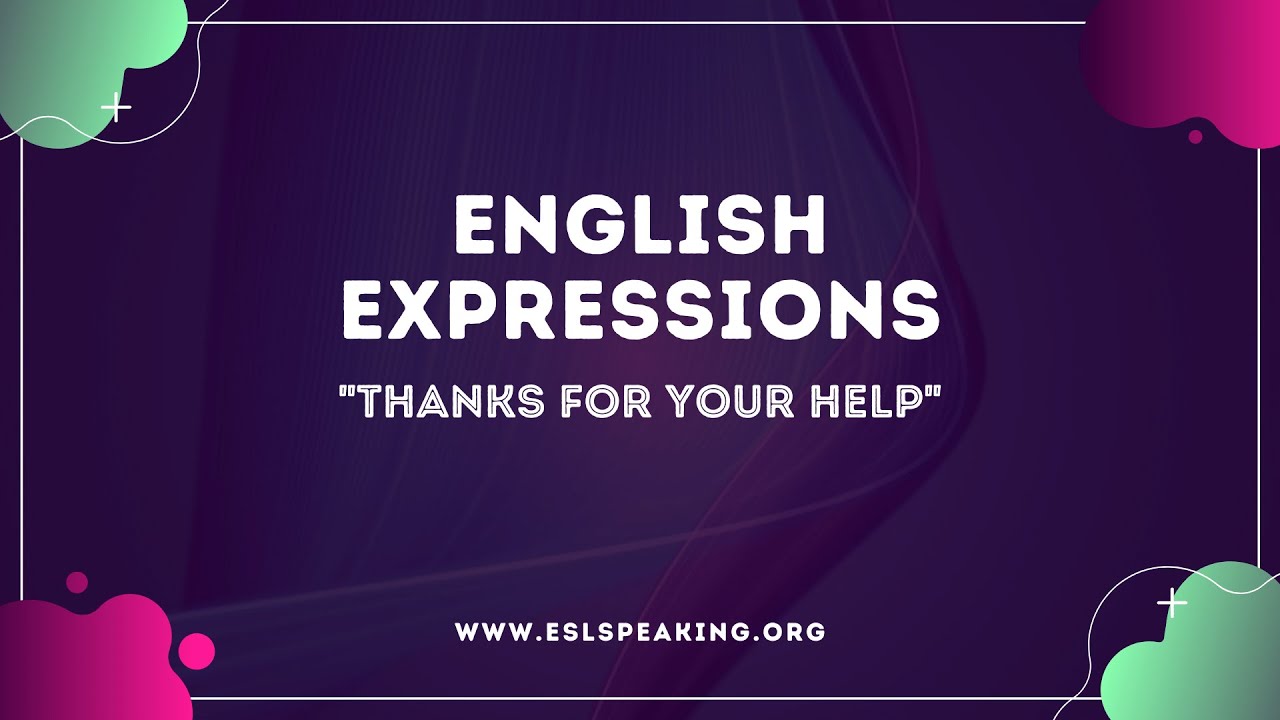
Thanks for your Help (A popular English expression) | Learn ...
8K views · Nov 23, 2022 eslactivity.org
Thanks for your help. It's a common English expression. Check out this video for all the details about when and how to use it. Thanks for your help. Some examples: "Thanks for your help today! I appreciate it!" "You're welcome! It was my pleasure." Want to find out more? Check out: https://eslspeaking.org/english-expressions/ 1001 English Expressions and Phrases: https://amzn.to/3vmYUBK Even more Ideas for the TEFL Classroom: https://eslspeaking.org/ https://www.facebook.com/eslspeaking https://www.pinterest.ca/eslspeaking/ #learningenglishwithjackie #learnenglish #englishphrasesforbeginners #englishforbeginners Transcript: Hi, everybody. This is Jackie from eslspeaking.org. Today's expression is, thanks for your help. So if someone does something very kind for you, you can say, "Thanks for your help." The other person will say, "You're welcome." You can also add, thanks for your help yesterday. Thanks for your help today.
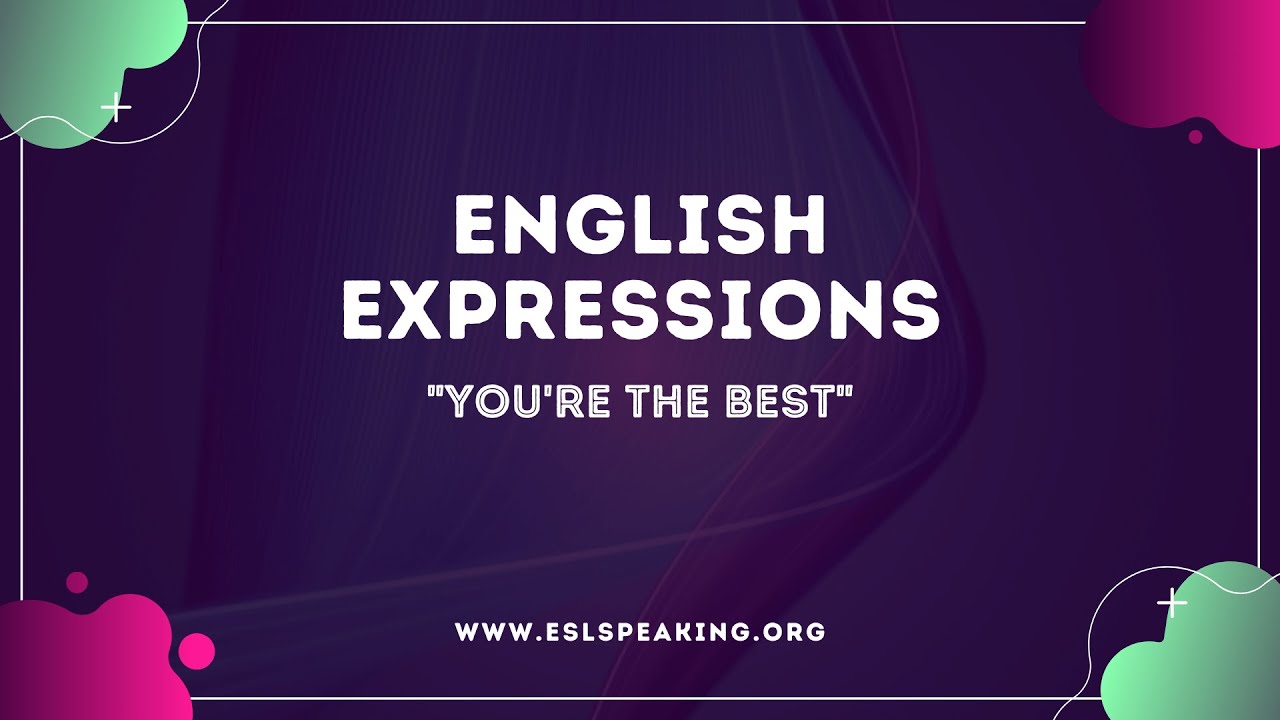
You're the Best (A Popular English Expression) | Learn A...
2K views · Nov 23, 2022 eslactivity.org
You're the best. It's a common English expression that people use to express thanks or appreciation to someone. Check out this video for all the details you need to know about it. You're the best. Some examples: -"Thanks for taking that shift. You're the best!" -"You're the best. I couldn't have done it without you." Want to find out more? Check out: https://eslspeaking.org/english-expressions/ 1001 English Expressions and Phrases: https://amzn.to/3vmYUBK Even more Ideas for the TEFL Classroom: https://eslspeaking.org/ https://www.facebook.com/eslspeaking https://www.pinterest.ca/eslspeaking/ #learningenglishwithjackie #englishexpressions #englishforbeginners #englishforbeginner Transcript: Hi everybody, it's Jackie from eslspeaking.org. Today's expression is, "You're the best." You're the best. If someone goes out of their way to help you in a big way, for example, maybe you have many bags of groceries, and you're having a very difficult time carrying them into your house and somebody says, "Can I help you?" You could say, "You're the best! Thanks so much." Or, maybe if you are a kid and your mom makes you the most delicious meal, your favourite meal, you could come home and say, "Mom! I love you. You're the best." So it's just a way of thanking somebody for doing something extra, or something big.
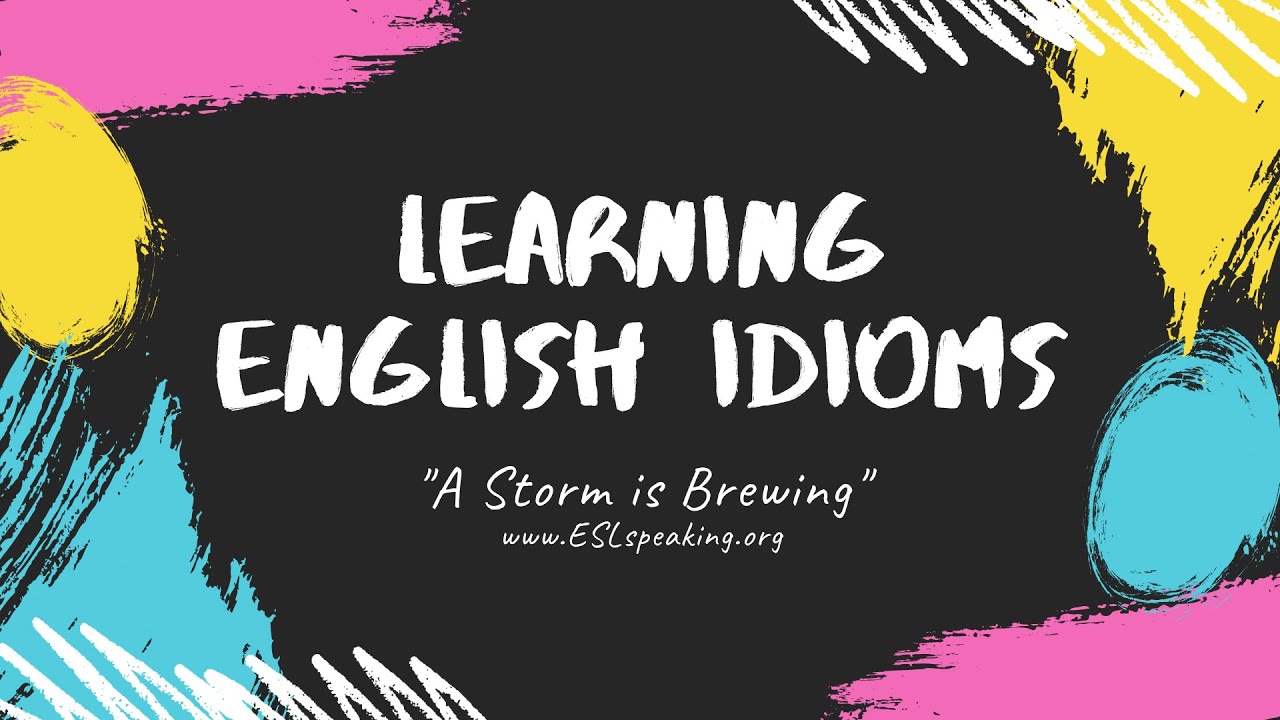
A Storm is Brewing (English idiom) | Learn American English ...
961 views · Nov 23, 2022 eslactivity.org
A storm is brewing means that some kind of trouble is coming in the future. It's a prediction of something bad that will happen. Check out the video for all the details about this popular idiom. A storm is brewing meaning: Difficulty or danger is expected in the future. A storm is brewing origin: Unknown but could be related to sailors reading the signs in the ocean and sky to predict a coming storm. A storm is brewing examples: "I think a storm is brewing at work between Marnie and Carrie. Things are getting tenser by the day." "I'm worried that a storm is brewing between my parents. They keep complaining to me about each other." ---------------------- Check out this English slang expression: https://www.youtube.com/watch?v=nBmzzg2myEk ---------------------- Want to find out more? Check out: https://eslspeaking.org/american-english-idioms/ The Big Book of American Idioms: https://amzn.to/3o6YxZi https://www.facebook.com/eslspeaking https://www.pinterest.ca/eslspeaking/ #learningenglishwithjackie #learnenglish #learningenglish #idiom #idiomsandphrases ----------------------- Learn English here: https://eslspeaking.org/confusing-words-in-english/ ----------------------- More English idioms from @Magnet Brains https://www.youtube.com/watch?v=FaNcvCHioRo ----------------------- Transcript: Hi everybody, this is Jackie from eslspeaking.org. Today's idiom is, a storm is brewing. A storm is brewing. That means danger is coming. It's not only about the weather, although you could say, you could look at the sky and say that a storm is brewing but it could be trouble about anything. So for example, if you are having a family dinner and your aunt and your nephew don't get along, but they are both coming, you could say, "A storm is brewing." It means there will be trouble ahead. Or, maybe at work. There are two people who don't like each other. Your boss puts them together on a team for a project. You could say, "A storm is brewing. Danger, danger, danger. Alright, if you like this idiom, please hit like subscribe, leave a comment below, and be sure to check out The Big Book of American Idioms.

Long Time, No See (A Popular English Expression) | Learn Ame...
2K views · Nov 23, 2022 eslactivity.org
Long time, no see is a common English expression that you can use when you haven't seen somebody in a while, maybe for a few months. Check out this video to find out how to use it! Long Time, No See examples: -"Hey Becca, long time, no see!" -"Yeah, it's been a while. How are you doing?" Want to find out more? Check out: https://eslspeaking.org/english-expressions/ 1001 English Expressions and Phrases: https://amzn.to/3vmYUBK Even more Ideas for the TEFL Classroom: https://eslspeaking.org/ https://www.facebook.com/eslspeaking https://www.pinterest.ca/eslspeaking/ #learningenglishwithjackie #learnenglish #englishexpressions #englishphrases Transcript: Hi everybody, it's Jackie from eslspeaking.org. Today's expression is, long time no see. Long time no see. You can use it if you haven't seen someone in a long time, maybe one month or two months, six months, something like that. So you're at school, at your university and you see someone who was in your class months ago but you haven't seen lately. Wow, long time no see! And they'll say, yeah it has been a long time, Alright, so that's today's expression. Long time no see, if you haven't seen somebody in a few months.
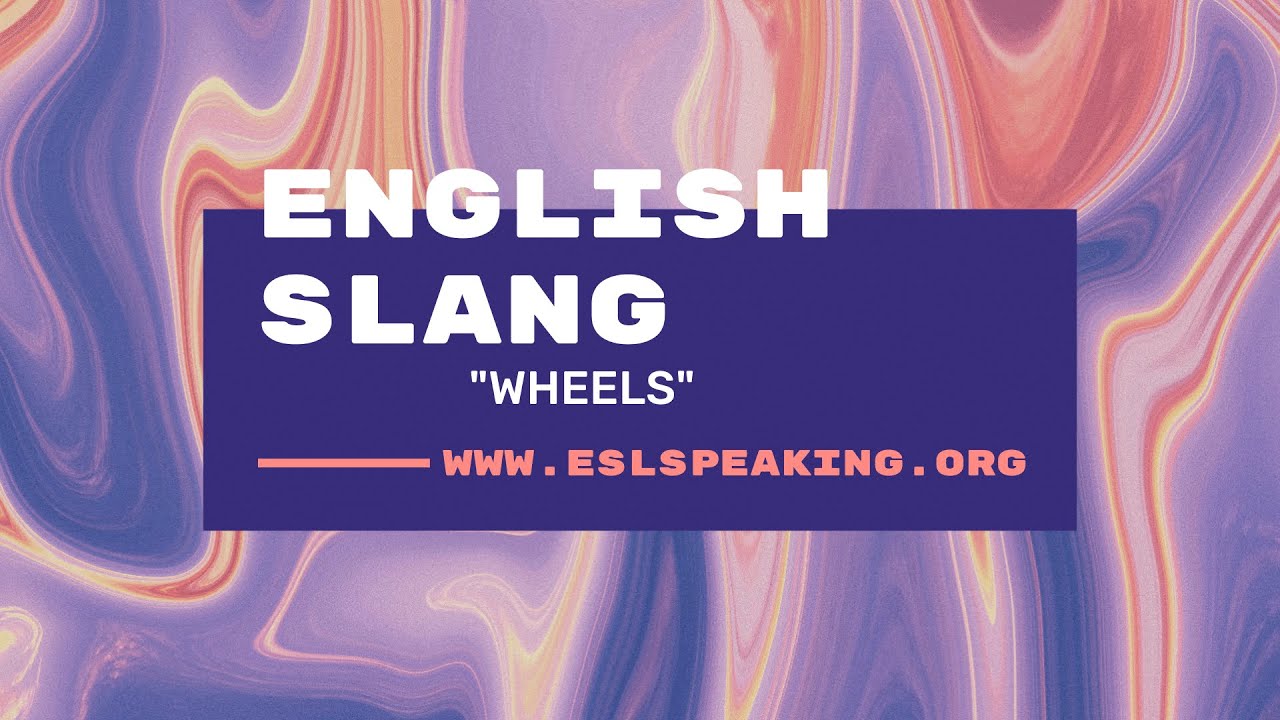
Wheels (American English Slang) | Learn American English in ...
1K views · Nov 23, 2022 eslactivity.org
Wheels is a slang word to refer to a car. It's an informal slang expression commonly used in the USA or Canada. Check out the video to find out more. Wheels definition = a car. Wheels examples: "Did you see her new wheels? Awesome colour choice!" "Hop in, we'll take my wheels to get there." ------------------------------------------------ More slang expressions: https://www.youtube.com/watch?v=xPpLglDFAzU ------------------------------------------------ Want to find out more about American English slang? Check out: https://eslspeaking.org/american-english-slang/ American English Slang: https://amzn.to/3oo2OYB https://www.facebook.com/eslspeaking https://www.pinterest.ca/eslspeaking/ #learningenglishwithjackie #englishslang #americanenglish #slangwords #linguamarina ------------------------------------------------- Learn to speak English: https://eslspeaking.org/category/learn-english/ ------------------------------------------------ Learn more American English slang with @Speak English With Vanessa https://www.youtube.com/watch?v=R1Ge9NFSDyE ------------------------------------------------- Transcript for wheels: Hi everybody, it's Jackie from esleaking.org. So today's slang is wheels. You know, wheels on a car or bicycle. The round things that move. Wheels also mean a car. For example, I got new wheels means I got a new car. "Check out those wheels," means, "Wow, nice car." So it's kind of a slang word you'd use with your friends. It's very informal so just say a car if you're talking to like your teacher or your boss or something like that but to your friend, you could say, oh nice wheels. Or, hey you got wheels. Something like that. Alright, so if you like this video please hit like, subscribe, leave a comment below and I will catch you next time. Bye, everybody.
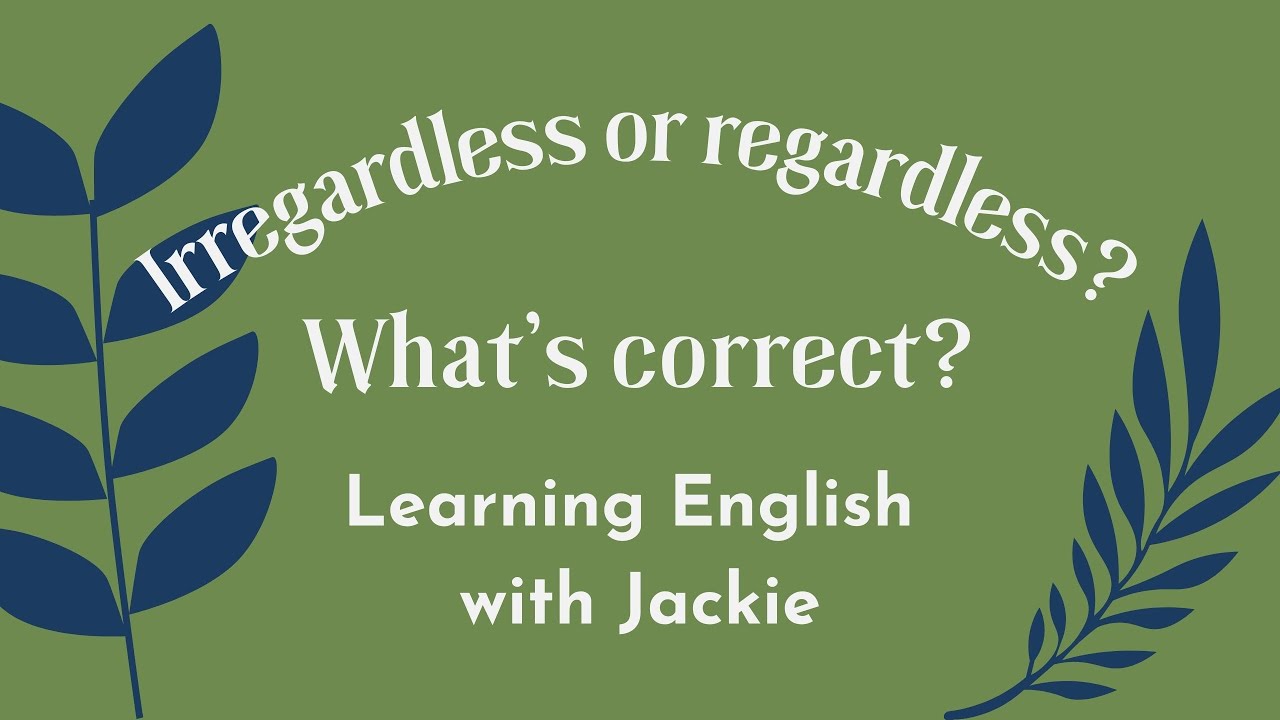
Is Irregardless Really a Word? | Should I use Regardless Ins...
954 views · Nov 23, 2022 eslactivity.org
Irregardless is the pet peeve of many a native English speaker who cares about grammar and word usage! What’s the issue with it and should you just use regardless instead? Keep on watching to find out all the details you need to know! ------------------- • Another confusing English words video: https://youtu.be/DkyVvI4npiI • Fake-Sounding REAL Words in American English by: @Advanced English with Mary Daphne https://youtu.be/k-6ErNlxcYc ------------------- Most Confusing Words in English Explained: https://amzn.to/3tcdddT -------------------- Even more teaching and learning English: https://eslspeaking.org/ https://www.facebook.com/eslspeaking https://www.pinterest.ca/eslspeaking/ https://www.instagram.com/jackie.bolen/ https://www.tiktok.com/@englishwithjackie?lang=en #teachingenglishwithjackie #confusingwordsinenglish ------------------- Irregardless: The main problem with this word is that it’s a double negative (with the beginning/prefix and the ending/suffix). This leads many people to even question whether or not it’s a word. Regardless: Use this instead! An adverb that means without paying attention to the present situation, despite the circumstances. Examples: Regardless of what you think, I’m still going to do it. She went ahead with her plans regardless. Tags: irregardless vs regardless, regardless vs irregardless, regardless or irregardless, irregardless or regardless, regardless irregardless, irregardless regardless, regardless, irregardless, learning english,learn english,teaching english,english grammar,learning grammar,How to speak English,grammar tips,confusing words,
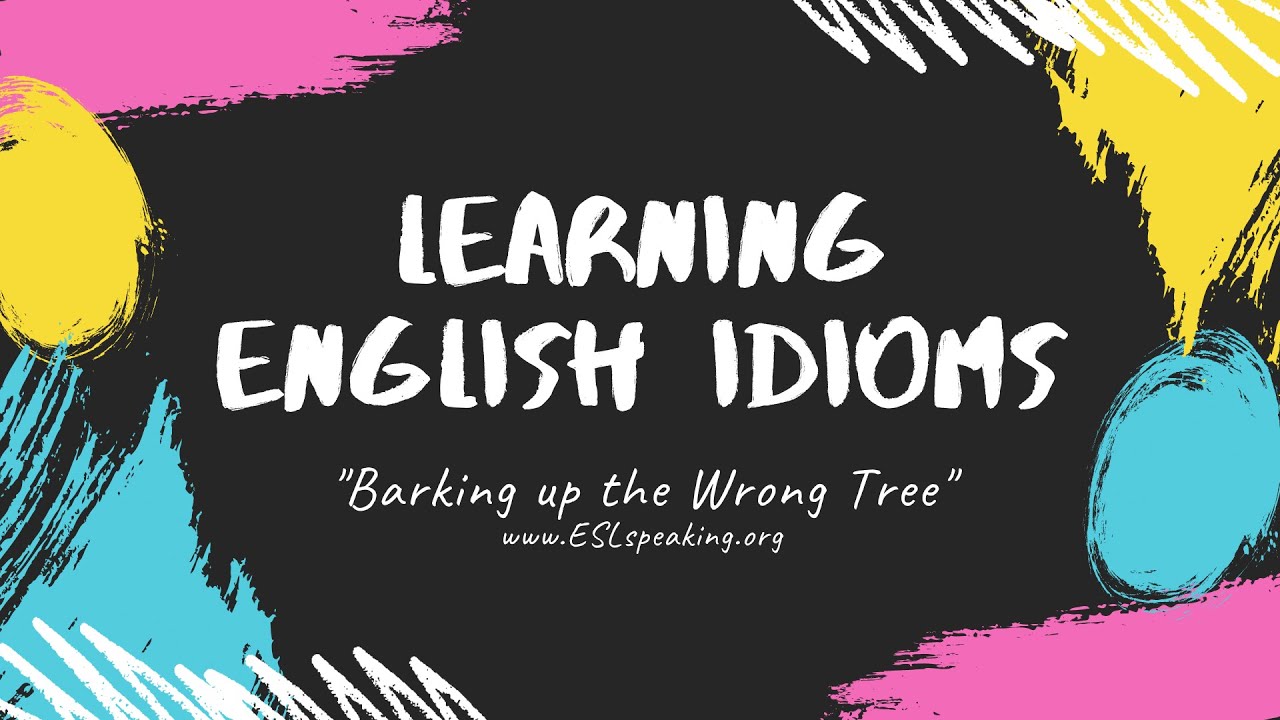
Barking Up the Wrong Tree (A Popular English Idiom) | Learn ...
552 views · Nov 23, 2022 eslactivity.org
Barking up the wrong tree is a common idiom in English. It means to blame the wrong person for something bad. Watch the video to find out all the details about it! Barking up the wrong tree meaning: Blaming the wrong person. Barking up the wrong tree origin: It's from the 1800s in the USA, where hunting dogs would bark at the base of a tree when they thought a wild animal like a raccoon was in it so that their owners could shoot it. But, the wild animal had sometimes had already escaped which left the dogs barking at the wrong tree. Barking up the wrong tree examples: "You're barking up the wrong tree here. Jeremiah broke your phone, not me." "My mom is always barking up the wrong tree and blaming me for stuff that my brother does." ----------------------------------------------- Check out another popular idiom: https://www.youtube.com/watch?v=aCF1CtacWvE ---------------------------------------------- Want to find out more? Check out: https://eslspeaking.org/american-english-idioms/ The Big Book of American Idioms: https://amzn.to/3o6YxZi https://www.facebook.com/eslspeaking https://www.pinterest.ca/eslspeaking/ #learningenglishwithjackie #idiom #idiomsandphrases #englishidioms #learnenglish ------------------------------------------- Learn English here: https://eslspeaking.org/category/learn-english/ -------------------------------------------- More idioms from @Learn English with EnglishClass101.com https://www.youtube.com/watch?v=Ix_di_rrQ4I ------------------------------------------- Transcript: Hi everybody, this is Jackie from eslspeaking.org. So today's idiom is, barking up the wrong tree. This comes from hunting when hunting dogs were used. The dogs would run around, looking for animals in trees and they would bark at the bottom of the tree so their owners could shoot the anima,l the bird, the raccoon, or whatever was in the tree. But sometimes, the dogs were wrong. They were barking at a tree but there were actually no animals in that tree. So what this means is you blame someone for something but it's not their fault. For example, two children and maybe something is broken and the dad says, "Hey you broke that thing" And this kid says, "You're barking up the wrong tree. It was my brother." So you're blaming him, but he didn't do it. It was actually his brother so his dad is barking up the wrong tree.
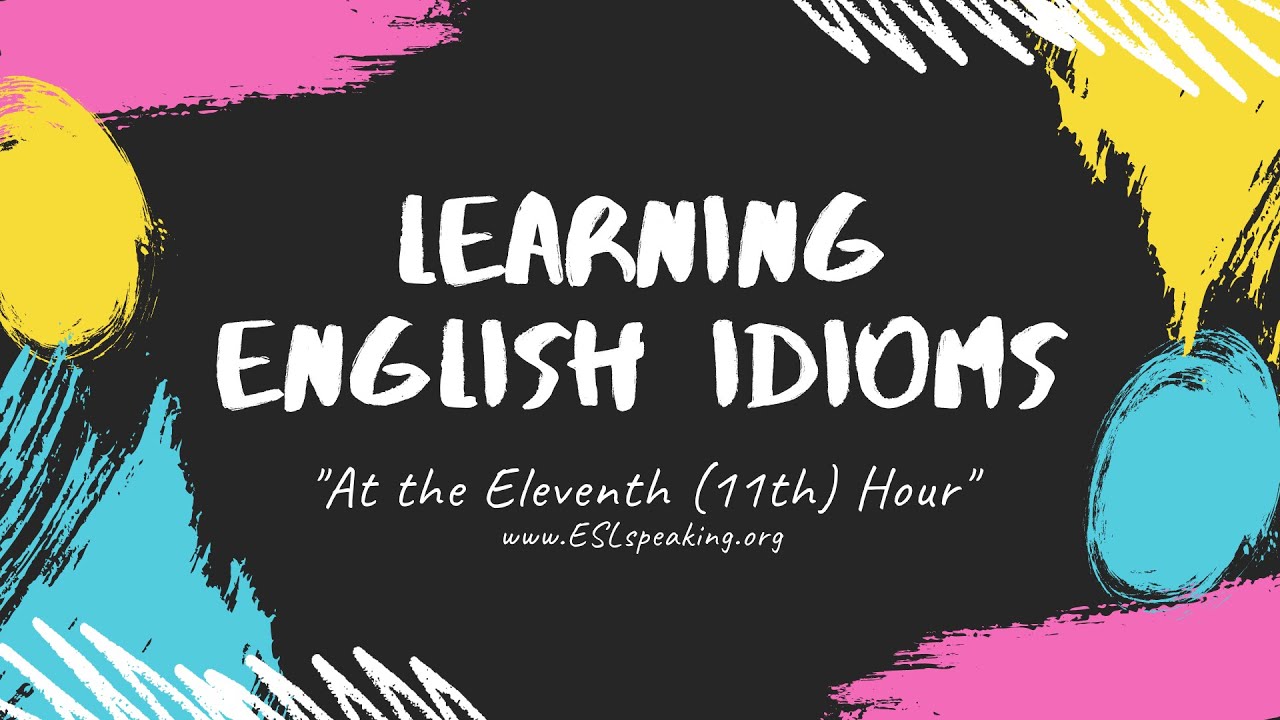
At the Eleventh (11th) Hour (A Popular English Idiom) | Lear...
141 views · Nov 23, 2022 eslactivity.org
At the eleventh hour (at the 11th hour) is a popular idiom that means to do something at the very last minute. Watch the video to find out all the details you need to know about it. At the eleventh hour meaning: At the last minute. At the 11th hour origin: Possibly from Mathew 20:9 in the Bible. In this story, each worker received a denarius (unit of currency) for a day of work, even those who started at hour 11 in a 12-hour day. At the eleventh hour examples: "That bank got bailed out by the government at the eleventh hour." "That meeting got called at the eleventh hour, right before I was getting ready to leave." ------------------------------------------ Another popular idiom: https://www.youtube.com/watch?v=A7JrDeWfaqo -------------------------------------------- Want to find out more? Check out: https://eslspeaking.org/american-english-idioms/ The Big Book of American Idioms: https://amzn.to/3o6YxZi https://www.facebook.com/eslspeaking https://www.pinterest.ca/eslspeaking/ #idiomsinenglish #idioms #englishidiomsandphrases #learningenglishwithjackie #idiom ---------------------------------------- Learn English here: https://eslspeaking.org/confusing-words-in-english/ --------------------------------------- More idioms from @GrammarSongs by Melissa https://www.youtube.com/watch?v=jUT_WSavAC8 --------------------------------------- Transcript for at the 11th hour: Hey everybody, this is Jackie from eslspeaking.org. So today's idiom is, at the 11th hour. At the 11th hour. It means at the last minute or the very, very last second. It might come from the Bible. There is a story about someone working all day, 12 hours and then getting one denarius, which is one day's pay. And someone starts working at the 11th hour, the end of the day and they also get one denarius, so the days pay, even though they only worked one hour. So that's where this might come from. Here are some examples, "They solved the problem at the 11th hour." It means they waited, waited, waited, and then fixed the problem at the last minute. If you like this video please hit like, subscribe, leave a comment, and say hello. I'd love to hear from you. Also, be sure to check out the Big Book of American idioms on Amazon.
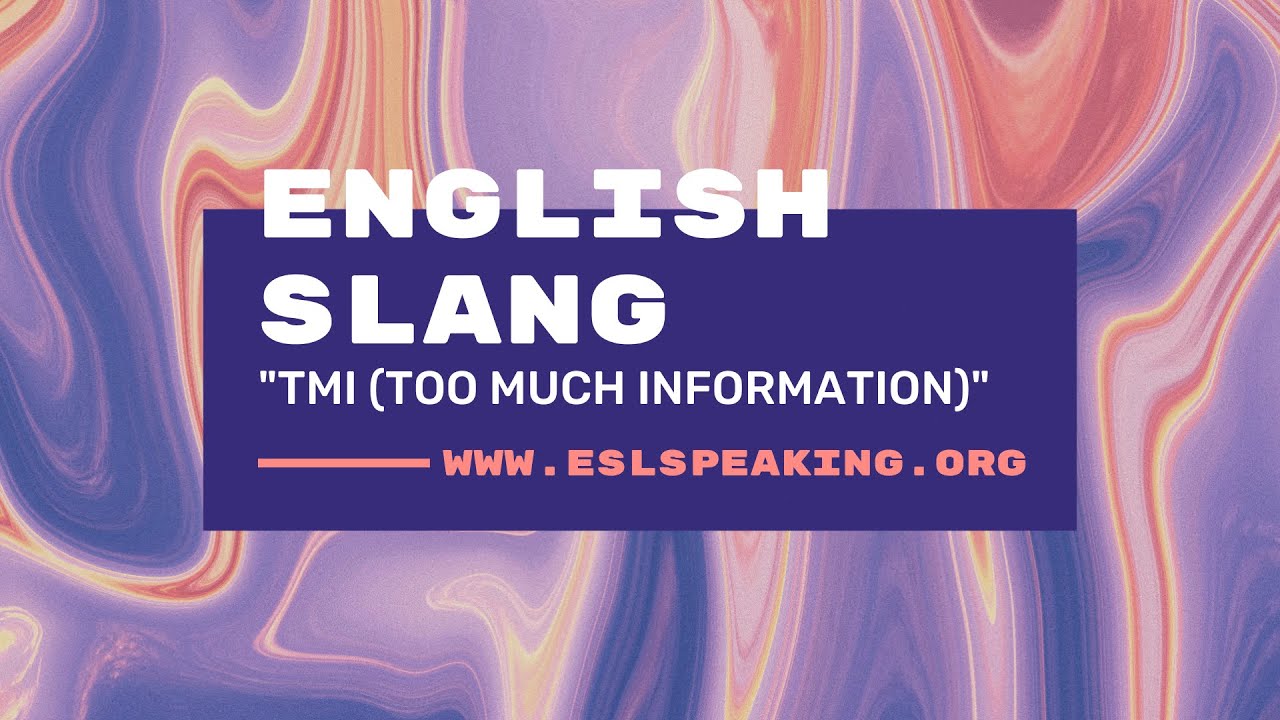
TMI (Too Much Information) American English Slang | Learn Am...
220 views · Nov 23, 2022 eslactivity.org
TMI or too much information is a funny way to say that someone is telling you something that you don't want to hear, usually things of a private nature. TMI = Too much information. Used to express displeasure when someone tells you something that you think should be kept private. TMI examples: "Dude, I don't need to know that, TMI!" "I don't wanna know how your finger broke, that's TMI!" ------------------------------------------------ More English slang expressions: https://www.youtube.com/watch?v=XgEvF_xHCpQ ----------------------------------------------- Want to find out more? Check out: https://eslspeaking.org/american-english-slang/ American English Slang: https://amzn.to/3oo2OYB https://www.facebook.com/eslspeaking https://www.pinterest.ca/eslspeaking/ #tmi #learningenglishwithjackie #speakenglish #speakingenglish #slang #englishwithjulien #englishcoaching #linguamarina ----------------------------------------------------------- Learn English here: https://eslspeaking.org/category/learn-english/ ------------------------------------------------------------- More English slang expressions from @Simple English Videos https://www.youtube.com/watch?v=8RJXV7A2mMI -------------------------------------------------------------- Transcript for TMI: Hi, it's Jackie from eslspeaking.org. So today's slang is TMI. TMI stands for too much information. If you're talking to your friend and they say something like, "I had a really bad stomachache and I had diarrhea last night." You could say, "Whoa, TMI. Too much information." It means someone has told you something that you didn't want to know. If you like this English slang word, TMI, please be sure to check out my book on Amazon: American English slang. I'll put the link down below.

Get Hitched (American English Slang) | Learn American Englis...
163 views · Nov 23, 2022 eslactivity.org
Get hitched. It's a funny, informal way to say that two people got married. Check out the video for all the details about it. Getting hitched definition = getting married. Getting hitched examples: "Ladies! I'm getting hitched!!!" "Did you hear? He got hitched in Vegas over the weekend!" ------------------------------------------------------------ Even more English slang: https://www.youtube.com/watch?v=XQAxfWqMtB0 ----------------------------------------------------------- Want to find out more? Check out: https://eslspeaking.org/american-english-slang/ American English Slang: https://amzn.to/3oo2OYB https://www.facebook.com/eslspeaking https://www.pinterest.ca/eslspeaking/ #hitched #learningenglishwithjackie #slang #englishslang #learnenglishspeaking #speakenglishwithvanessa #englishforeveryone ------------------------------------------------------------- More ideas for learning English: https://eslspeaking.org/category/learn-english/ -------------------------------------------------------------- More slang from @Everything American English! https://www.youtube.com/watch?v=VrpSBGU7SWM -------------------------------------------------------------- Transcript for get hitched: Hey, it's jackie from esleaking.org. So today's slang is, hitched or getting hitched, got hitched, etc. Getting hitched means you got married. Getting married is very formal. Less formal is we got hitched. Here are some examples. - My girlfriend and I got hitched last month. We got married. - My cousin got hitched last week.
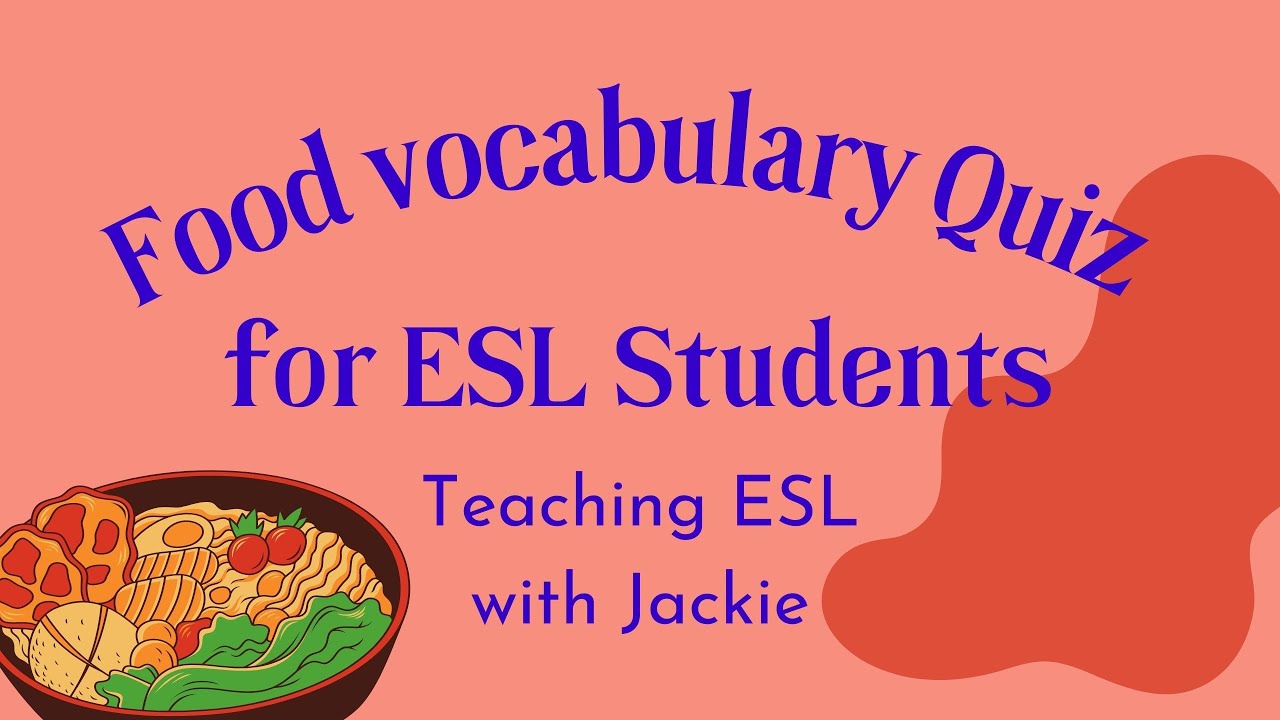
Food Vocabulary Quiz (Easy) | Fun Food and Drink Games for E...
40K views · Nov 23, 2022 eslactivity.org
Full blog post with more Food & Drink games and activities for ESL learners: https://www.eslactivity.org/esl-food-games/ Are you looking for some fun and engaging activities about food and drink? There are plenty of food-related games and other ESL lesson plans ready for English teachers. Watch the food vocab quiz video and read through the description to get more information on food & drink games for beginner English learners. Have some fun with this easy English quiz for food and drinks. Answer Keys Which animal does milk come from? (Cow) What is the yellow part of an egg called? (Yolk) What is the white, inside part of an egg called? (The white/ albumin) What sweet food is made by bees? (Honey) What is butter and cheese made from? (Milk) What vegetable can you see at Halloween outside of people's houses in the USA or Canada? (Pumpkins) What is the main ingredient in ketchup? (Tomato) What is the most popular fast food restaurant in the world? (McDonald’s) Which fruit is very bitter and yellow? (Lemon) Which fruit is wine made from? (Grapes) ------ Want to find more ESL Vocabulary Games & Activities for kids? Check out my book: https://amzn.to/3wrUihg https://www.facebook.com/eslspeaking https://www.pinterest.ca/eslspeaking/ https://www.instagram.com/jackie.bolen/ https://www.tiktok.com/@englishwithjackie?lang=en #esl #teachingEnglish #quiz ------------------------------------------------------- BGM : Yummy Flavor Produced by Umbrtone Provided by Umbrtone-No copyright music Video Link: https://youtu.be/tAaFg2u-i2c -------------------------------------------------------- Tags: esl, teaching esl, teaching activities, english, learning english, esl games, english teacher, Classroom games, ESL kids, TEFL activities, TEFL classroom, classroom tips, TEFL, review games, esl review game, English review, classroom activities, efl, efl activities, tefl, tefl activities, teaching English, teaching teenagers english, teaching kids english, Quiz for kids, beginner quiz, esl quiz, quiz game, quiz activity, teaching kids, kids esl quiz, easy quiz, quiz for esl, holiday quiz, holiday, holiday game, christmas, guessing game,
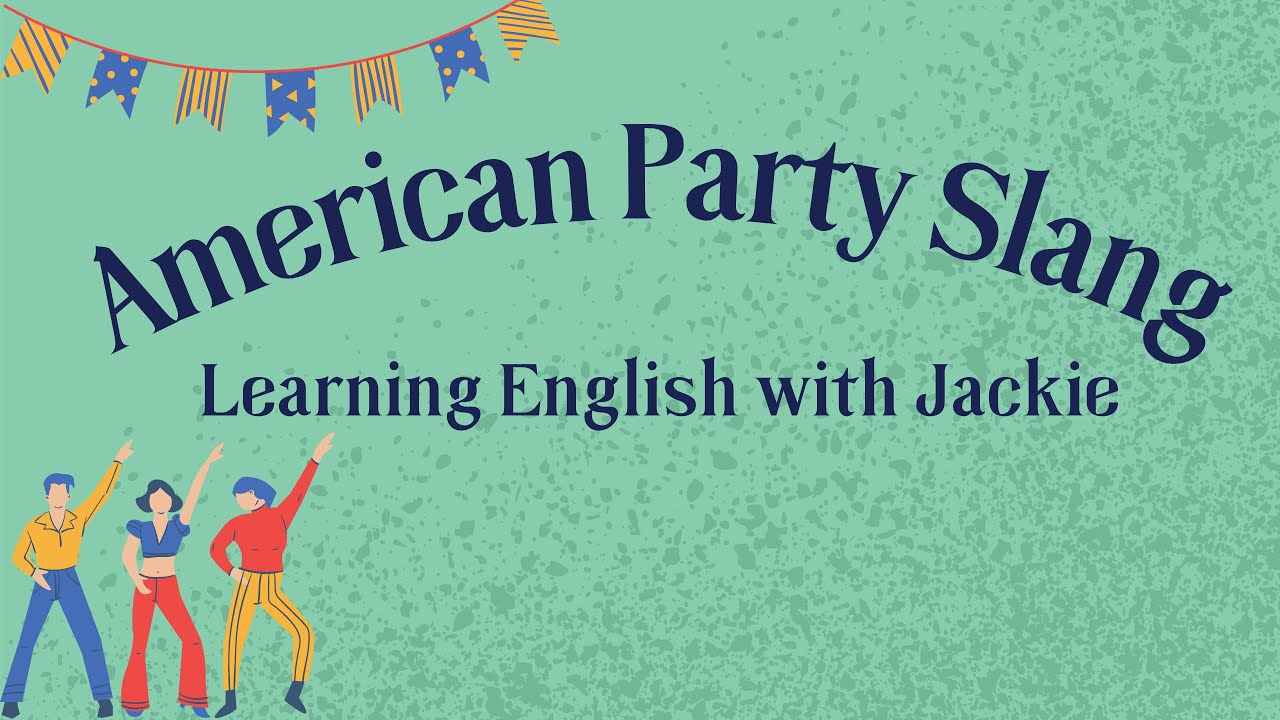
American Party Slang | Learning English with Jackie
68K views · Nov 23, 2022 eslactivity.org
American Slang can be a bit funny at first. Have you ever heard someone exclaim “that party was rad,” or “She's such a party animal” and wonder what it really means? They are English slang expressions! Check out this video to find out more about American English Party slang. ------- • Full blog post here about more American Slang: https://eslspeaking.org/american-english-slang/ • If you liked this content, watch another American Slang video here : https://youtu.be/K7iMsh56h2Y • Don't forget to check out @BusinessEnglishwithChristina video with more American English Slang: https://youtu.be/Vgzmci2cAJc ------ American English Slang: Dialogues, Phrases, Words & Expressions for English Learners: https://amzn.to/3wxyTkP https://www.facebook.com/eslspeaking https://www.pinterest.ca/eslspeaking/ https://www.instagram.com/jackie.bolen/ https://www.tiktok.com/@englishwithjackie?lang=en #englishidioms #learningenglish #learnenglishonline ------------------------------------------------------- Even more Ideas for the TEFL Classroom: https://eslspeaking.org/ -------------------------------------------------------- Transcript: Hey everybody, this is Jackie from eslspeaking.org.Today I'm going to talk about party slang. So who doesn't want to learn more American or Canadian English slang? Probably everybody. Here are my favourite things that you might want to use at a party or to describe a party. Number one: party animal. This is a person that loves to party every Friday night, every Saturday night, maybe Tuesday night, and Thursday night. They're going to a party, they're drinking lots, they're talking, they're always having fun at parties. Here's an example sentence. You could say, "Oh, my sister is such a party animal," or, "My ex-boyfriend was such a party animal but i didn't like it so we broke up" because maybe you didn't like to party but he liked to party and he was a party animal so that's why you broke up. Number two, this is how you describe someone who's had way too much to drink. You could say they're wasted. They've drunk so many alcoholic drinks. They've had too many beers too many glasses of wine and you could say, "That guy—he's very drunk," or, "I got wasted last night. I had too many drinks last night." Number three, these words you could use to describe anything that was really, really fun or really, really great. The two words are epic and rad. I really like these words a lot so you could say, "That party was epic." That means that the party was amazing or very, very fun. Or, you could say, "That party was so rad," which means the party was great or you had a really good time at the party. This one is also related: a blast. So if someone says, "How was the party?" You could say, "I had a blast." That means I had a really fun time. If you had a party you could say "I hope everybody had a blast at my party." All right, so this one, you know, sometimes at a party some people have had way too much to drink and maybe this person is like sleeping on your couch or at a restaurant they're just kind of like sleeping under the table, whatever, something like that. You could say that person is passed out or blacked out. It's not good. It's very very bad actually because your friends or your boyfriend or girlfriend will have to help you get home. You cannot go home by yourself because you're just kind of like sleeping and you've had so much to drink. So you could say, I blacked out last night. I can't remember what happened at that party." Or, "My boyfriend is passed out over there. I'm so embarrassed." Something like that. All right, the next one. This is at a party with illegal drugs, not alcohol. Maybe there's also alcohol but this is involving drugs. For example, marijuana or cocaine. I don't know, I don't want to list them all but you maybe know them so this is how you describe someone who's been taking illegal drugs. You could say they are high or stoned. You could say, "Last night, I got so high. It means that you smoked so much marijuana. Or, you could say, "She's so stoned. she's acting very crazy." Something like that. Okay, so those are my party slang words for you. I hope that you enjoyed this video. If you did, please hit like, subscribe and leave a comment below and please tell me your favourite party slang that you like to use. And also be sure to check out my book on Amazon: American English Slang. You'll find lots of good stuff and learn how to talk like an American or a Canadian. I'm from Canada so either way. Same same America and Canada, almost the same in terms of slang. --- Tags: learning english,english slang,fun slang,usa party slang,slang words usa,slang usa,english slangs,english slang words,english party slang,canada party slang,stoned,drunk,stoner,American PartySlang,American slang,Funny american slang,
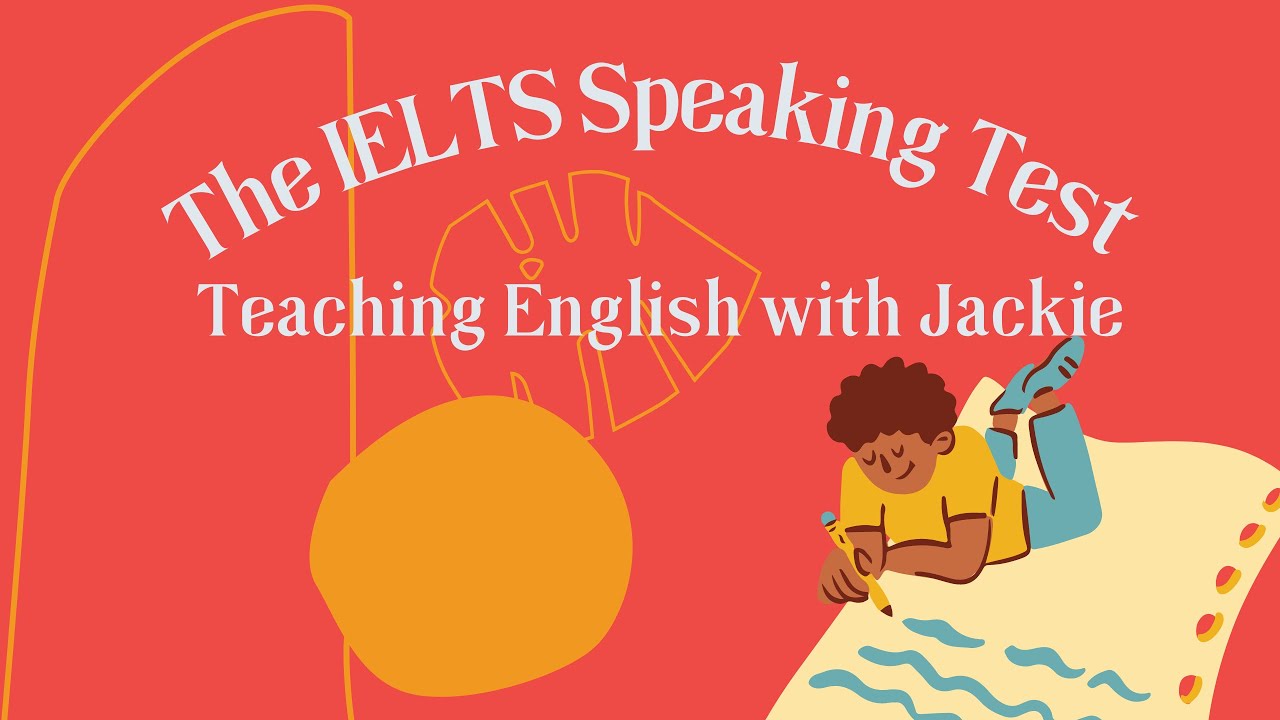
IELTS Speaking Test Grading: Fluency, Vocab, Grammar & P...
5K views · Nov 23, 2022 eslactivity.org
If you’re looking for some information about the IELTS speaking test grading criteria, then you’re in the right place. We’re going to give you the rundown on the four categories that are evaluated, including Fluency & Coherence, Lexical Resources (Vocabulary), Grammatical Range & Accuracy, and Pronunciation. Find out how to get a higher band score on the IELTS speaking test by knowing how you are graded. ------- Other ESL videos that you should watch! • IELTS speaking exam tips: Get a higher band score for IELTS Speaking : https://youtu.be/FWsuz4G2XWQ • Watch @FastrackIELTS video IELTS Reading Tips and Tricks | How I got a band 8 : https://youtu.be/w_tIn3BGGPM ------ Want to find more tips on how to improve your IELTS speaking score and improve your vocabulary? Check out: https://amzn.to/3oQnTeQ https://www.facebook.com/eslspeaking https://www.pinterest.ca/eslspeaking/ https://www.instagram.com/jackie.bolen/ https://www.tiktok.com/@englishwithja... #esl #ielts #teachingenglishwithjackie ------------------------------------------------------- Even more Ideas for the TEFL Classroom: https://eslspeaking.org/ Full blog post: https://eslspeaking.org/ielts-speaking-test-grading-evaluation/ -------------------------------------------------------- Timestamp: 0:00 Intro 0:26 General vs academic 0:50 Band 1-9 1:56 Fluency and coherence 2:55 Lexical resources 3:47 Grammar 5:06 Pronunciation 5:41 Conclusion Transcript for IELTS speaking tips: Hey everybody this is Jackie from esleaking.org. So I'm going to talk about IELTS speaking test evaluation. How do you get your grade on the IELTS speaking exam? I know it's a bit of a mystery, you just check your results and you get a band nine, you get a band six, you get a band two, whatever, but how do you actually get that score and how can you get a better score? All right so first of all I'll talk about the general IELTS exam versus the academic IELTS exam. For the speaking test it's exactly the same for both people: general or academic so don't worry about that at all. On the IELTS speaking section, you can get band 1, which is the lowest to band 9, which is the highest. Band one is basically you don't say anything you say zero words or "hello" and then you stop talking that's how you get a band one. Band nine is basically you are a native English speaker. The good news is that you don't really need to get a band nine in most cases for things like immigration or getting into a university or basically for anything usually a five, six, seven or eight is all you need. So there are four categories that you're graded on: the first one is fluency and coherence. Fluency is how fast you're speaking, if you pause before a sentence it's fine it means you're thinking about what you're going to say. However, if you pause before every word it means you're thinking about the words to say. You don't actually know enough vocabulary because you have to stop and think before every word, so don't worry about pauses before you say a sentence. It means you're just thinking about something but once you start speaking in your sentence just keep going and try to go for no pauses. The next one: lexical resources. That's a fancy way to say vocabulary. So you want to use precise accurate vocabulary to describe something that you're talking about if you use it. Watch like, many words like stuff, things, that kind of thing, you won't do well on this section. You want to use precise language and if you want to get a band 7 or above you'll also need to use things like idioms, expressions, phrasal verbs, "get up", "sit down", that kind of thing. You need to use that more. Kind of, I don't know, what would you say? The next thing is grammatical range and accuracy. So your grammar, to score well on this part of the exam you basically need to use simple grammar perfectly. If you're making lots of simple mistakes with things like a subject-verb agreement like "there are many people" or "there are many people" simple mistakes like that you actually won't do well on this, so you need to use simple grammar perfectly but then you also need to use more complicated grammar for example relative clauses or conditionals. Finally is pronunciation. So this is the simplest one. Are you easy to understand? Yes or no. If the answer is "yes" you will do well, if the examiner is like "what did they say?", "I don't understand" or "pardon me?", "I didn't understand" you won't do well on this. So speak clearly, speak at a medium pace. You don't need to speak super quickly, don't speak very very slowly, try to speak at a normal medium pace and yeah that's about it! So those are the four ways that you're graded for the IELTS speaking exam. Tags: IELTS exam, exam, english exam, english test, english tips, tips for learning, study tips, ielts coaching centre near me, Fastrack IELTS, ielts study plan, study plan for ielts, fast track ielts
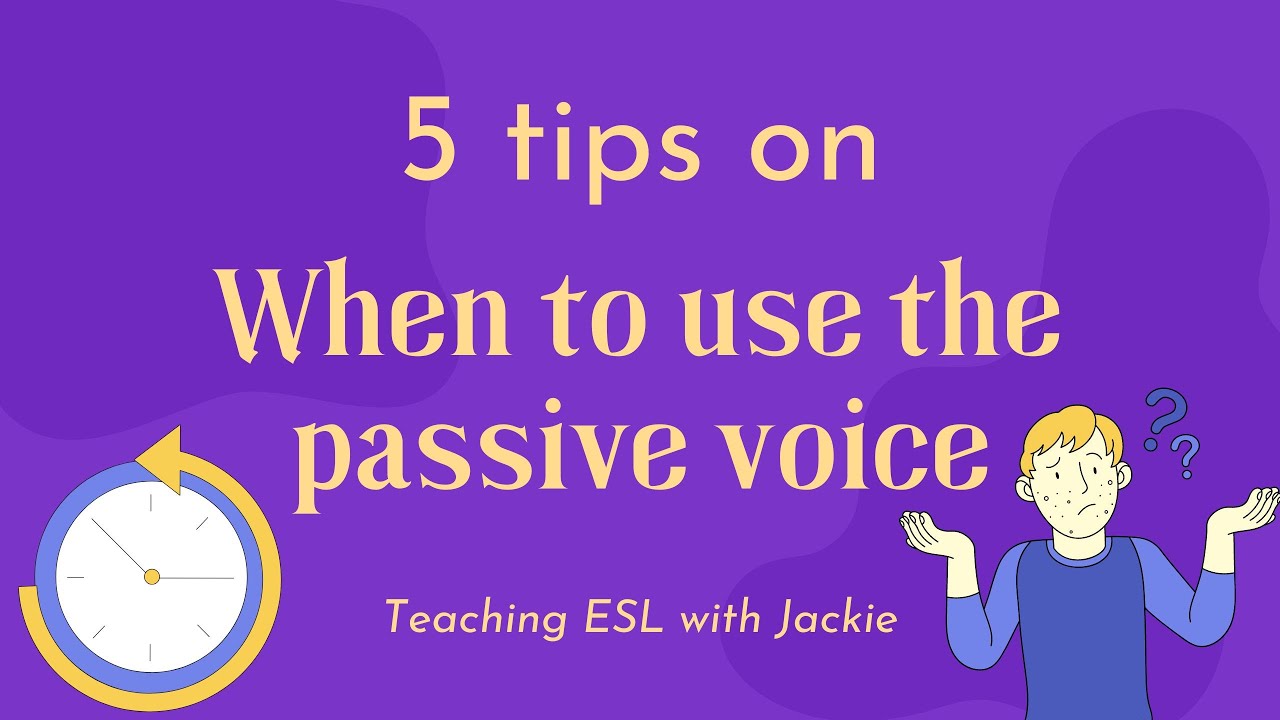
5 Tips for Teaching the Passive Voice to English Learners | ...
44K views · May 18, 2023 eslactivity.org
Here are five key teaching tips for the passive voice. It’s a bit of a tricky grammar point, but with this video, you will be a pro in no time. In this video, I give 5 examples of how to teach the passive voice. Keep on watching for all the details! ------- • Check out this blog post for more details including activities, worksheets and lesson plans for this unit: https://www.eslactivity.org/passive-games-esl/ • Want a video on when, why and how to use the passive voice? Watch @engvidAdam video here: https://youtu.be/C6pHfjH0Efg • Want another video for English learners? Watch my Homophones video here: https://youtu.be/p4c-DPcM_1Y ------ Check out my book English Vocabulary Builder Workbook here: https://amzn.to/42udKYr https://www.facebook.com/eslspeaking https://www.pinterest.ca/eslspeaking/ https://www.instagram.com/jackie.bolen/ https://www.tiktok.com/@englishwithjackie?lang=en #teachingenglishwithjackie #eslgames #passivevoice -------------------------------------------------------- Transcript Teaching the Passive Voice: Hi this is Jackie from eslspeaking.org, today I'm going to talk about when to use the passive voice. So don't use the passive voice all the time in writing or speaking. It's not a great way to speak or write in English, however there are some very specific situations in which you might want to use the passive voice, I will talk about six of them. So the first case is if you don't know who did the action. For example, I was at work and I came back to my desk and the cake was eaten. I had cake on my desk, someone ate it but I don't know who ate it. The second one; is it doesn't matter who did the action. So for example, a solar plant will be built. It doesn't matter who will build it, somebody will build it. But it doesn't matter who it is. Alright, the third one is if you don't want to give too much information about who did the action, for example, mistakes were made. Somebody made mistakes but I don't want to name a specific person because maybe they will get in trouble, or I will get in trouble, or they will be mad at me. Another situation to use the passive voice is for a general truth. For example, rules were made to be broken. The next case to use the passive voice is to emphasize the thing that was acted upon, not the person who did the action. So for example; insulin was discovered in 1921. So maybe you're writing a research paper about insulin, but the paper is not about the person who invented it. That's a small part of it, but you're talking about insulin. So in this case, you could use the passive voice. The final situation to use the passive voice is for scientific papers or lab reports. So, for example, the salt was dissolved. So, it doesn't matter who dissolved the salt. If you're talking in a scientific paper only that the salt was dissolved by somebody. Timestamp for Teaching the Passive Voice: 0:00 Intro 0:11 How not to use the passive voice, and 5 examples of when to use it 0:27 Example 1: If you don't know who did the action 0:45 Example 2: It doesn't matter who did the action 0:59 Example 3: If you don't want to give too much information 1:20 Example 4: A general truth 1:28 Example 5: To emphasize the thing that was acted upon 1:55 Example 6: For scientific papers or lab reports 2:19 Outro Tags: Teaching the Passive Voice to English Learners, Passive Voice, esl teaching tips, esl grammar tips, how to teach esl grammar, passive voice lesson plan, passive voice, teaching the passive voice, grammar points, how to teach English to kids, how to teach english, how to teach english grammar, how to teach english to adults, how to english, how to teach esl easy, how to teach esl step by step, step by step teaching, passive voice learning, how to learn passive voice,
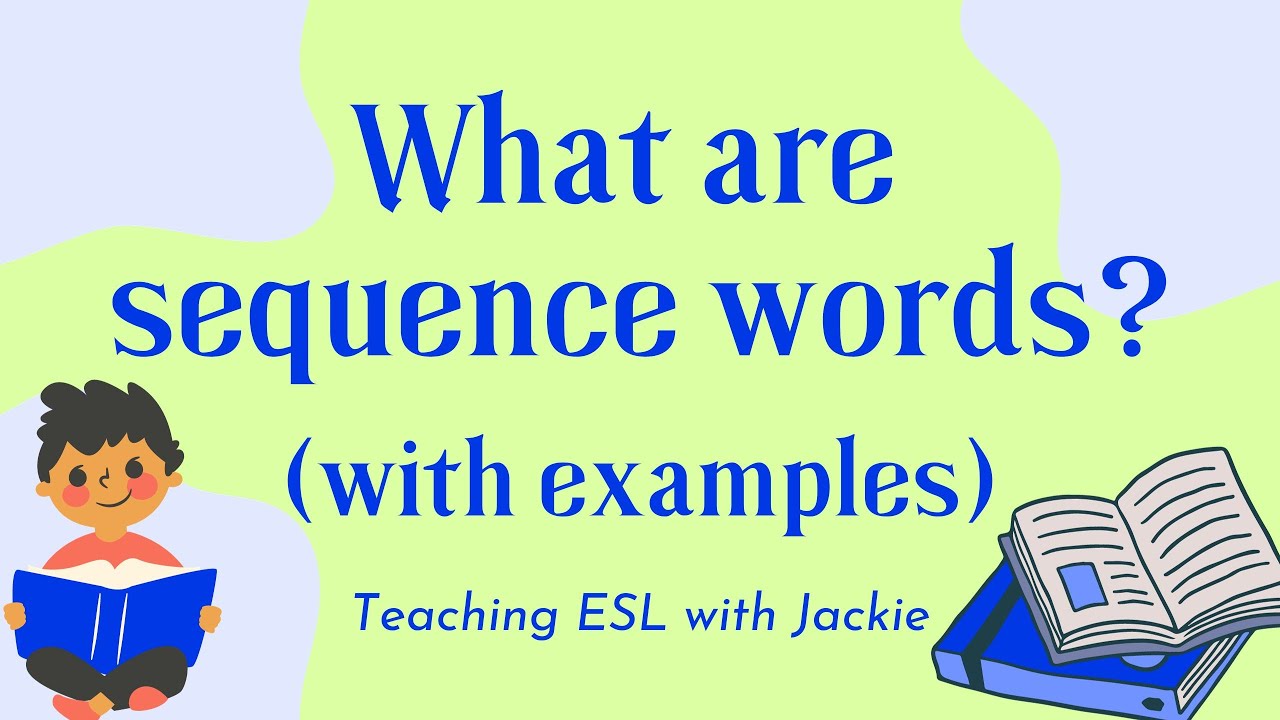
What are sequence words? | Teaching ESL reading and writing
8K views · Oct 24, 2023 eslactivity.org
What are sequence words? Sequence words or linking words help us understand what’s happening in a story of a piece of text. They tell us what’s happening in the beginning, middle, or end of the story. They can also tell us that something is interrupting something else. They are also known as transition or chronological words. Keep on watching for the most important examples of sequence words to use in the beginning, middle, and ending of a sentence. ------- • Check out this blog post for more details and 50 more examples of sequence words: https://www.eslactivity.org/sequence-words-list/ • Watch this in depth video on how to use sequencers in English by @englishwithemma here: https://youtu.be/sFrHK7cHzkA?si=VVPLWNFQBfAcCLW4 • Want another video to improve your English? Watch my 10 phrases we use daily video here: https://youtu.be/bdfOUbNP9Xg ------ Check out my book ESL/EFL Teaching Practice and Methodology here: https://amzn.to/3CFNEWs https://www.facebook.com/eslspeaking https://www.pinterest.ca/eslspeaking/ https://www.instagram.com/jackie.bolen/ https://www.tiktok.com/@englishwithjackie?lang=en #teachingenglishwithjackie #teachingenglish #sequencewords -------------------------------------------------------- Transcript: Hi, today I'm going to talk about sequence words. Sequence words describe the order of things in time. They are used to help people understand events like what's first, what's next, what's last and how things are related to each other. They're very important in writing and also we use them in speaking as well, but they are most important in writing and even writing a paragraph, a sentence, something like that, you will want to use sequence words. I'm going to talk about some of the most important sequence words that you might want to be aware of. So first of all is beginning words. You could say things like; first, initially, to begin with, one day, or first of all. So you would all see these words kind of at the beginning of a paragraph, or the beginning of a story. Maybe an email that tells a story something like that. Next there are some sequence words for describing the middle. Things like; next, meanwhile, secondly, in addition to, are all middle sequence words. The next sequence words are to describe the end of things. For example; finally, in the end, eventually, by this point, things like that are sequence words used for the end. There are also sequence words used to interrupt something. So things like; suddenly, unexpectedly, but then, so. if you're talking about something, then suddenly something else happens you could use these kind of sequence words. Timestamp: 0:00 Intro 0:09 What are sequence words? 0:30 The most important sequence words 0:36 beginning sequence words 0:53 middle sequence words 1:03 end sequence words 1:16 interrupting sequence words 1:30 Outro Tags: what are sequence words, sequence words, sequence word, sequence in a sentence, sequence words list, sequencing vocabulary, sequence writing examples, signal words list, sequence words, sequencing words examples, time sequence words, list of sequence words, what is a sequence word, time order words examples, sequence of ideas, example of sequence of events, sequence in writing, sequencing english, sequence ideas, sequencing in English, sequencing examples, example of a sequence, transition sequence words,